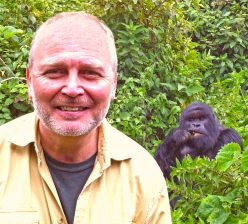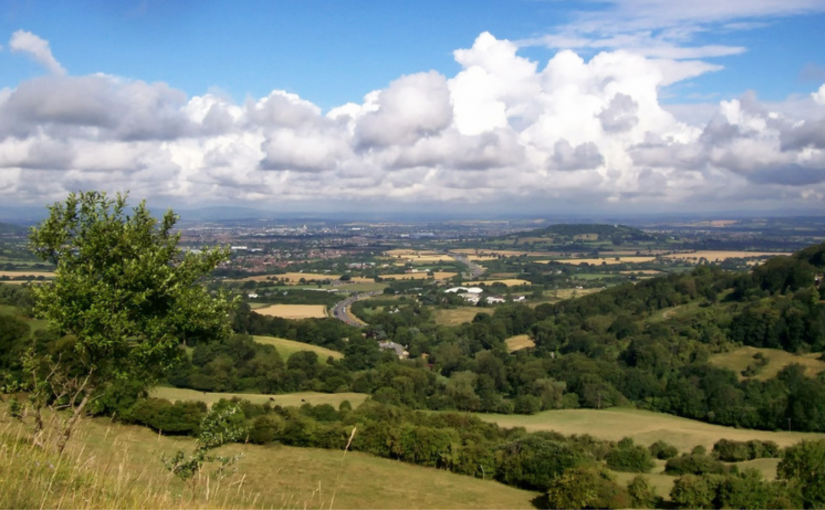by Jonathan Lorie
As I walked out one midsummer morning I found myself in Laurie Lee’s Gloucestershire, a glorious region of rippling valleys, ancient villages and echoes of an older England. This is where the much-loved country writer was born in the final summer of the Edwardian era – June 1914 – and I had come here to find the rural world that he captured so magically in his memoir of childhood, Cider With Rosie.
I started at one of Laurie’s favourite places – Painswick Beacon, a hill so high that from the Iron Age fort on top you can see all the way to Wales. Here Laurie used to come with his schoolboy friends in the 1920s, to marvel at the view. Clambering up its stony ramparts, I reached the summit and simply stood and stared.
This must be one of the finest vistas in England. For 25 miles I could see, across rolling fields and brimming hedgerows to the blue teeth of the Malvern hills, past the red roofs of Gloucester with its Gothic cathedral poking skywards. To the left shone the pewter coils of the Severn river, and beyond it the faint smudge of the Black Mountains, 40 miles away. To the right was the wooded hill where villagers still roll Double Gloucester cheeses at Whitsun in an ancient and anarchic local custom. And behind me was the first of the crinkled little valleys that Laurie Lee called home.
No wonder he came up here as a boy. No wonder that 25 years after he left the village where he was raised, he caught so powerfully the glory of the English countryside. All of this world was his, preserved for posterity in his memoirs and poems. A childhood spent here would not leave you easily.
I turned and followed the stony path down, through the classic Cotswold village of Painswick where Laurie met his first girlfriend, and across a valley to his home village of Slad. At first I walked the Cotswold Way, then Stepping Stones Lane where hay lay heavy and sweet in the fields, and finally a broken old drover’s track through dark woods and high meadows of orchids and butterflies. A green holloway swept me down to Slad itself – which seemed no more than a hamlet really, a scatter of stone houses strung above a stream.
There was a war memorial, a church and of course a pub. The Woolpack was a classic village inn, a simple place of scrubbed wood and friendly drinkers, a long narrow room along the side of the hill with windows onto a sweeping view. They served a cider called Old Rosie, and in one corner was the blackened settle where Laurie himself used to sit.
Today his seat was occupied by a younger poet, Adam Horowitz, who grew up in the valley in the 1970s and knew Laurie since then. At that stage Laurie had made a return to the village, after years as a writer in London, enabled by the success of Cider With Rosie to buy a cottage and settle with his wife and daughter back here. He encouraged the young Horowitz to write poetry, even at one stage bribing him with a fiver to “Go and get drunk and write some poetry!”
I ordered a pint and sat beside Adam. “My abiding impression of Laurie,” he said, “is of him standing with his arms outstretched, a big smile on his face, a little tipsy, being roguish and charming.” There was a photo of Laurie above the bar, in just such a pose. “He said it’s difficult to write if you’re living in Slad, because either there’s long grass for lying in the sun, or else there’s someone knocking on your door saying ‘Come to the pub for a chat.’ But at the heart of him, he needed to be here, to reconnect. It was a grounding thing.
“If you’re growing up here as a writer, as I did, the landscape talks back to you. Walking through it inspires poetry. It’s both safe and wild. The past springs up, in the drystone walls or the shape of the fields. And there’s a continual cycle of death and life, change and decay, a seasonal cycle, as any nature writer will tell you. There’s a certain need for this sort of landscape – and for writing about it.”
We ambled out into bright sunlight and Adam showed me the village. Across the road from the pub lay the old church, with a window dedicated to Laurie in 2011. Outside was his grave, a simple stone inscribed with the words ‘He lies in the valley he loved.’ On its reverse we found some lines from his sweetest poem, April Rise, blessing a day in spring.
Up the lane was a bank of bright flowers leading down to his childhood home – Rosebank – the bleached stone cottage described in Cider With Rosie. In his day it was crowded with seven siblings and cluttered by his eccentric mother Annie. It’s still lived in by a country family, whose harassed mother was bustling around the garden keeping two toddlers from crying in the midday heat. I asked whether she ever thought about Laurie and his family squeezed in there. “Oh no,” she said firmly, “not unless I’ve been watching the films. You don’t live in the past.”
But the past was all around us. Further on was the old squire’s house, a handsome Tudor mansion in stone where Laurie and his friends went carol-singing each winter. Just beyond it was the gloomy pond where a spinster drowned herself, in one of the spookier chapters of his book. “It’s just fading from living memory,” Adam mused. “That’s why I think his work will last.”
The edge of living memory was where I was heading next. I said goodbye to Adam and walked past the pond towards the last cider orchard in the village. Across steep and boggy fields, through a footpath unsigned and overgrown with nettles, lay Furners Farm. I was welcomed into its medieval interior by Julie Cooper, who sat me in the dark kitchen and poured a glass of her home-made cider. So this was the stuff that they drank back then. It was cool but fierce, like a softened brandy.
“We met the original Rosie once,” she smiled, “if there was a real Rosie. About 20 years ago they brought her here for a documentary. She’d been a postmistress in Cheltenham. She was in her seventies, she’d been to the school here, and she sat on the swing in our garden. She was very sweet. But she didn’t remember kissing Laurie Lee under a hay wagon.”
She introduced me to her son, a handsome 13-year-old whose name was Laurie. As I turned to go, she whispered: “The kiss with Rosie happened in the second field beyond the stile. Past the old apple trees. Look out for it.”
So I stumbled along there and stood on a field still laid to hay, sweeping down to the stream and the village beyond. Laurie always said there were several Rosies in reality and his book could have been called Cider With Edna or Cider With Doreen. But whatever the truth of it, the setting for his delicious tale could easily have been this patch of earth.
In his essay on Writing Autobiography, Laurie suggested that ‘the only truth is what you remember’. Critics have questioned how much of his famous trilogy of memoirs was really true. Some say the timings cannot be accurate in As I Walked Out One Midsummer Morning, his achingly romantic memoir of walking across Spain as a penniless busker of 19 in 1935. Veterans of the Spanish Civil War query his account of volunteering for the republic, in A Moment Of War. The documentation does not exist to ever really tell. But someone who knows more than most is his daughter, Jessy, who still lives in the village.
I walked back to her cottage. It had whitewashed walls and an inglenook fireplace and a garden bright with flowers. “This was my childhood home,” she said, fixing me with enormous green eyes. She had the soft mouth and easy charm of her father, as though one were meeting him again. “This is where we all lived. It was wonderful being brought up here, playing in the stream, picknicking on Swift’s Hill. We were here together when he died. On a beautiful evening the sky turned totally black and a double rainbow stretched across the valley. It was extraordinary. Afterwards people sent me photos of it.”
She paused and stared into space. “It was awful for mum and I, just after he died, to have these nasty attacks from people saying ‘Was Laurie telling the truth about Spain?’ What’s wonderful is there’s so much more evidence now.”
For Laurie’s centenary in 2014, Jessy published a book of his paintings and drawings, which she had found after his death in 1997, hidden beneath a bed. “The book is a homage, really, to Dad – because I never really thanked him.” She pauses. “He did often seem tormented, which is one of the side effects of great art. But then he wrote wonderful celebratory poems about the landscape. And his prose was a long version of his poetry. I defy anyone not to get something out of his work.”
I thank her and turn to go. As I wander away down the winding lane of the village, I recall one further memory of Laurie. I met him myself, just once, at a reading he gave in London of his poems. It must have been the late 1970s. By then he was in his sixties, but he read the rippling words in a soft and heavy voice with a rich West Country accent, a voice you can hear in the prose of his books.
Afterwards I found him at the bar, nursing a small glass of white wine. Beside him was an untouched tray of tumblers filled with cider. “Aren’t you drinking the cider?” I asked. “Oh no,” he smiled, “I don’t touch it any more. You can get into trouble with that.”

